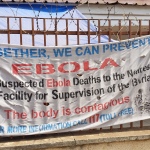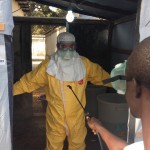A team of researchers from the London School of Hygiene & Tropical Medicine and Innovations for Poverty Action Sierra Leone developed a study evaluating the use of mobile technology in improving the process of tracing contacts of Ebola patients in Sierra Leone. As part of this study, the team, with the help of a developer, designed a customized application using Dimagi’s CommCare that has been implemented in the district of Port Loko. The research team seeks an individual or small group of mHealth experts to
Continue reading →
This comment piece identifies problematic assumptions behind communication and social mobilisation strategies which rely on using biomedicine to correct local logics and concerns and which cast them as misinformation. The effectiveness of using standardised advice for non-standardised situations is questioned.
Physicians, scientists, and public health experts shared their experience from the front lines of fighting Ebola virus disease in this symposium session presented at the American Society of Tropical Medicine and Hygiene (ASTMH) 63rd Annual Meeting in New Orleans. Speakers also discussed challenges and advances in methods of control and the promise of possible future solutions. Watch video here.
As of November 4, 2014, the current Ebola outbreak in West Africa is confirmed to have infected 13,268 individuals, with 4,960 total deaths estimated. The global Ebola response is evolving rapidly, and as it has evolved, it has become increasingly apparent that the causes of this epidemic outbreak result from the underdevelopment of local regional healthcare systems, and several initial errors in the global Ebola response that lead to an underdevelopment of emergency response capabilities, and resulted in complications with triage, treatment, community mobilization and engagement, and communications efforts.
Continue reading →


